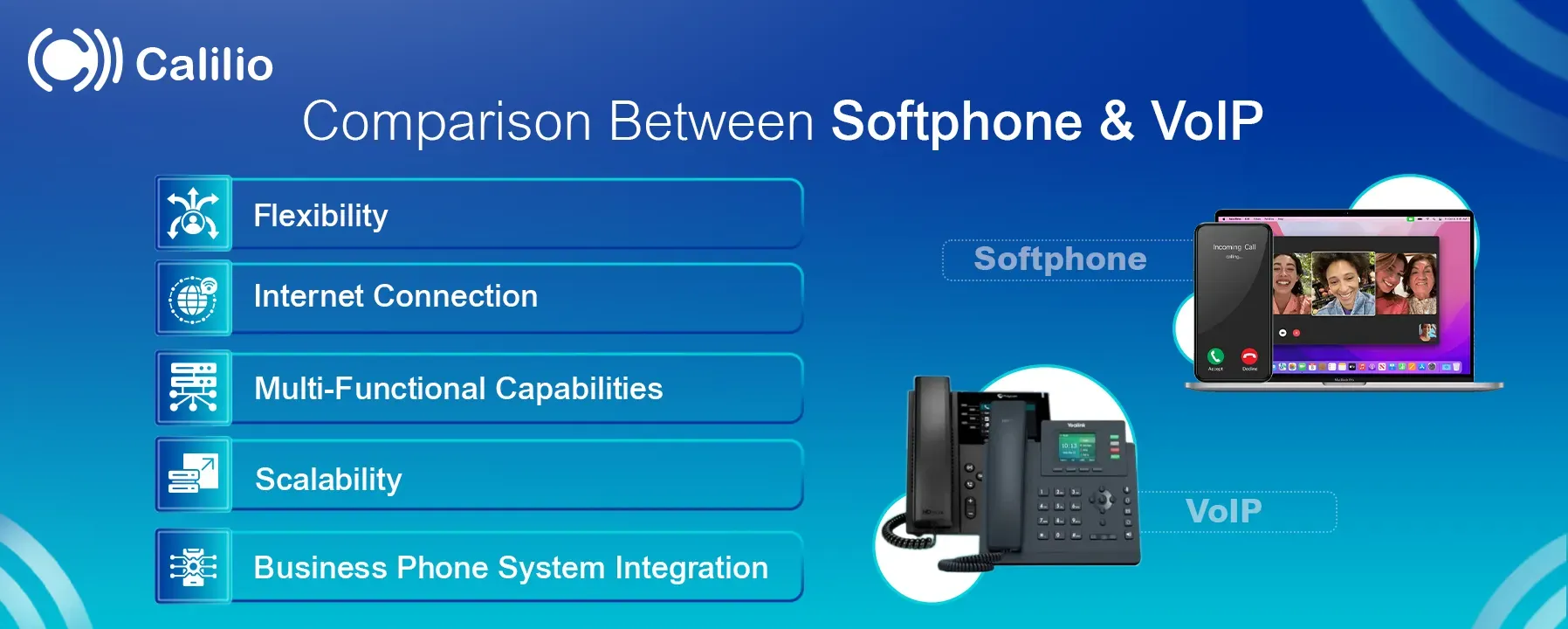Softphone vs VoIP: Which Is Best for Your Business?

In today's world, businesses and individuals increasingly rely on internet-based communication to make phone calls. Likewise, the two popular web-based calling mediums are softphones and VoIP (Voice over Internet Protocol) phones.
While both solutions rely on VoIP technology for calling, they cater to different needs and offer several advantages. So, let's explore the key differences between softphones and VoIP phones in terms of features, cost, flexibility, and best use cases, making it easier to decide which one is best for business.
Introduction of Softphone
A softphone is a software application that allows users to make phone calls over the Internet from a computer, tablet, or smartphone. It requires physical hardware like the ones mentioned and can be used from anywhere as long as you have a stable internet connection.
Hence, a softphone is ideal for remote workers, frequent travelers, and businesses with employees working from different locations. It provides features similar to those of a traditional desk phone, including call forwarding, voicemail, and conference calls. Some of its examples are Calilio, Zoiper, X-Lite, etc.
Features
- Video Calls
- Integration with CRM Systems
- Visual Voicemail
- Team Messaging
- Call Recording
- Multiple Device Support
- Remote Call Forwarding
- Real-Time Call Monitoring
Introduction of VoIP Phone
A VoIP phone is a physical device specifically designed for making calls using VoIP technology. They look and function like traditional phones but use the Internet instead of regular copper wires and rely on circuit-switched networks to connect calls.
VoIP phones are hardware-based. Unlike softphones, they require a fixed office location, where workers are stationed at desks. Thus, they are suitable for established companies and businesses and can be a good alternative to PBX (Private Branch Exchange).
Features
- Multiple Call Lines
- Programmable Buttons for Speed Dialing
- Conference Calling
- Call Management
- API (Application Programming Interface) Access
- Call Logs
- Business Text Messaging
- Auto Attendant
Have The Same Working Mechanism
Both VoIP phones and softphones use a device's data connection to send and receive voice data packets over the Internet. They connect to the recipient's phone system using a VoIP protocol like SIP (Session Initiation Protocol). The SIP converts the user's voice into digital data packets, which are transmitted over the Internet to the recipient's device and converted into audible sound.
Furthermore, when you call from a landline number to a VoIP phone, your voice signal travels through the traditional phone network (PSTN) until it reaches a VoIP gateway. This gateway converts the analog voice signal into digital packets, which are then sent over the Internet to the VoIP phone, where the data are converted back into sound and vice-versa.
Comparison Between Softphone and VoIP
As mentioned above, softphones and VoIP phones work the same way. While they share some common features and advantages, they also have differences. Let's learn about this in detail.

Flexibility
Both offer flexibility compared to traditional phones. However, softphones offer more mobility as they can be installed on laptops, desktops, or mobile devices and operated from anywhere with a reliable internet connection.
Internet Connection
As mentioned above, softphones and VoIP phones rely on a stable internet connection to make and receive calls. Unlike conventional landline phones, they bypass the public switched telephone network and transmit voice data through the Internet. While a softphone’s network signal can fluctuate, VoIP phones have a steady signal as they are mostly connected to an Ethernet wire.
Multi-Functional Capabilities
Both offer multi-functional capabilities that go beyond traditional voice communication. They offer features such as voicemail, call forwarding, conference calling, and integration with business applications.
Scalability
Softphones and VoIP phones allow firms to add additional numbers or extensions effortlessly and cost-effectively without needing physical infrastructure. However, softphones come with a dedicated application/dashboard, making it easy to manage extra extensions, while things can get messy with a VoIP phone.
Business Phone System Integration
Softphones have a user-friendly interface that provides access to many different communication features and helps in easy integration with modern business phone systems. However, VoIP phones have limited access to and control over features such as instant messaging.
Factors | Softphone | VoIP |
Type | Software application | Physical hardware device |
Cost | Requires a subscription fee to access the software | Higher cost as it requires additional hardware |
Flexibility | Highly portable | Fixed location, less mobile |
Call Quality | Depends on device and network quality | Generally higher and more stable |
Best Use Case | Remote workers, small businesses, startups | Offices, businesses with PBX |
Features | Multi-functionality | Basic calling features, multi-line support |
Security | Robust encryption methods and secure protocols (e.g., Transport Layer Security, Secure Real-time Transport Protocol) | VoIP phones also use the same security protocol as softphones to provide secure communication over the internet |
Easy of Use | User-friendly interface | Traditional phone-like interface |
Hardware Requirements | Works on existing devices like a mobile, laptop, or desktop | Must purchase additional physical hardware |
Reliability and Maintenance | High maintenance in terms of the internet, comparatively less reliable | Low maintenance in terms of network, more reliable due to dedicated hardware |
Wrapping Up
Both softphones and VoIP phones have their own importance and benefits. If you have remote workers or a new startup and want greater flexibility, go for softphones, but if you are an established one, choose VoIP phones. However, the latter is expensive compared to softphones as it requires physical hardware and could need maintenance in the future. On the other hand, softphones are budget-friendly solutions that can be easily installed on existing devices, need just an internet connection, and require low maintenance.
So, if you are looking for a cost-effective softphone application with high-quality audio, register with Calilio. Plus, enjoy its affordable pricing plans with advanced VoIP features, with the standard plan starting at just $15 per month.

Get Cashbacks Up to 43% Straight To Your Wallet!
Unlimited Virtual Numbers – Local, Mobile & Toll-Free from 100+ Countries
Free Local Phone Number from US or Canada
Crystal-Clear Calls Starting at Just $0.0153/min
24/7 Human Support – Because Great Service Never Takes a Holiday


Frequently Asked Questions
What is the primary difference between a Softphone and a VoIP phone?
A softphone is a software application that uses VoIP technology for communication, whereas a VoIP phone is a device that uses Wi-Fi and cable-based internet connections (Ethernet).
Do I need special hardware to use a Softphone?

Still have questions?
Can’t find the answer you’re looking for? Please chat with our friendly team.
Stay in the loop
Get the latest call insights, trends, and updates delivered straight to your inbox.
By subscribing, you agree to receive updates from Calilio.
You can unsubscribe anytime.